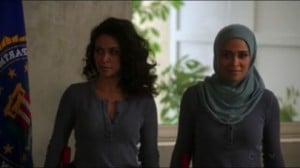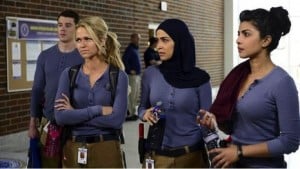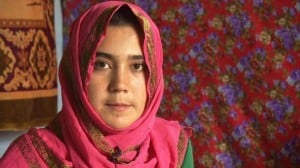In October and November of this year, PBS aired a five part series, “Women, War & Peace,” in the United States. The series website explains: “Women, War & Peace spotlights the stories of women in conflict zones from Bosnia to Afghanistan and Colombia to Liberia, placing women at the center of an urgent dialogue about conflict and security, and reframing our understanding of modern warfare.”
Several of the episodes in the series focus on conflicts that Muslim women face and resist around the world: Bosnian women in I Came to Testify tell their story of war and rape at the hands of Serbian forces, and their courageous journey that led to rape to be considered a crime in international law. The award-winning Pray the Devil Back to Hell tells the story of this year’s Nobel prize winner Leymah Gbowee’s activism in the organization she helped found, “The Women of Liberia Mass Action for Peace,” which brought Christian and Muslim Liberian women together to collectively promote peace in their country. And Peace Unveiled (sigh—another veil pun title) looks at the political activism of the Afghan Women’s Network and their work to promote the rights of women in Afghanistan.
These women’s stories are difficult to listen to—the violence, setbacks, and social norms they face seem immeasurable at times. The episodes highlight the complexity of how conflict affects their everyday lives. A Bosnian woman who testified at the Hague, Witness 99, shares her thoughts after the trial towards the end of I Came to Testify; the accompanying scene shows a Bosnian woman who visits the grave of a family member to offer her prayers:
“I was glad that everyone would answer for what they had done, but it wasn’t a very harsh sentence…You know that rape is the worst form of humiliation for any woman. But that was the goal—to kill a woman’s dignity.”
Another insightful segment from Pray the Devil Back to Hell describes how the collaboration between Muslim and Christian Liberian women came to be. Asatu Ban Kenneth, now the assistant director of the Liberian National Police, speaks up at a church where Leymah Gbowee had presented the work of the Christian Women’s Peace Initiative:
“I’m the only Muslim in this church…God is up. We’re all serving the same God. This is not only for the Christian women. I want to promise you all today that I’m going to move it forward with the Muslim women.”
The secretary of the organization explains that there were some initial concerns by the members of its newfound interfaith nature:
“But the message that we took on: Can the bullet pick and choose? Does the bullet know Christian from Muslim?”
The impact of conflict on women’s personal, family lives remains a prevalent theme throughout the series. In Peace Unveiled, one of the women featured throughout the episode explains why she continues her work to increase women’s participation at peace negotiations in Afghanistan:
“I don’t want to go back. I want to make it easy for my daughters. We will struggle. We will struggle until the last breath. We cannot do anything alone. We are part of the world.”
From all of these wrenching situations they find themselves in, these women continue to challenge political systems that do not value their voice—sometimes with the assistance of outsiders but always with the strength of their own personal convictions—using nonviolent methods to promote change in their countries. The series ultimately sends a positive message of hope and change.
When hearing about the conflicts in these countries in conventional news reports, it is rare to hear about the stories from women’s perspectives. It was nice to watch a series where women predominated and shared their experience with conflict. Stories of their challenges and their work to address the violence they face is rarely, if at all, a perspective that is mentioned.
I can’t recall another television series that explores how women address the impact of political strife from different parts of the world. Instead, we often hear third-person accounts of the violence these women face, as opposed to the efforts of women on the ground who actively work to engage with the systems they live with to promote their well-being.
Two weeks ago, we looked at the problematic depiction of Saudi women in Amnesty UK’s video, “How not to be punished for being a woman.” This unfortunate video is only one of several videos Amnesty produced in attempt to educate the public about the abuses women (often Muslim) suffer around the world. In another film, a British actress highlights the plight of Afghan women under Taliban rule from her flat in London.
Looking at both videos, a theme emerges: that women from these countries have no agency and make little effort to combat the social rules of the societies where they live. This one-sided narrative does little to promote discussion of how social conventions can change, or to consider the inspiring work that actually happens on the ground. These powerful stories can’t be reduced to “humorous” educational human rights videos. It is in the face of videos like those that the stories of the Women, War, and Peace series are especially important, giving us a more intricate picture of courageous, strong women not as victims but instead as actors shaping the context around them.
You can watch all five episodes of the series at PBS’s “Women, War & Peace” website.













